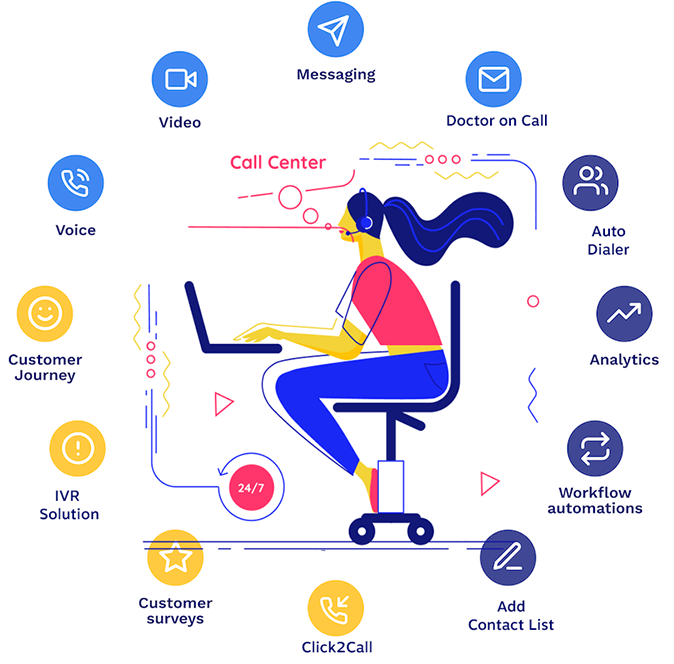In the era of digital transformation, businesses are constantly seeking innovative ways to streamline their operations and enhance customer experiences. Cloud telephony has emerged as a game-changer, revolutionizing the way businesses communicate and interact with their customers. Leveraging the power of the cloud, this technology offers a wide range of uses and benefits that can significantly impact the success of any organization. In this blog post, we will delve into the world of cloud telephony, exploring its detailed uses and highlighting the numerous benefits it brings to businesses.
What is Cloud Telephony?

Cloud telephony, also known as hosted telephony or cloud-based telephony, refers to a communication system that relies on the internet and cloud computing to manage voice calls, messages, and other telephony services. Unlike traditional on-premises phone systems, which require expensive hardware and complex infrastructure, cloud telephony operates through a virtual setup, eliminating the need for physical equipment. This technology allows businesses to access advanced telephony features and functionalities without heavy investments.
Detailed Uses of Cloud Telephony:
Virtual Phone Systems: Cloud telephony enables businesses to set up virtual phone systems, eliminating the need for traditional phone lines and physical infrastructure. With virtual phone numbers, organizations can establish a local presence in multiple locations, enabling customers to call and connect with them easily. Virtual phone systems also offer features like call forwarding, voicemail, call routing, and interactive voice response (IVR) menus, enhancing the overall communication experience.
Call Center Solutions: Cloud telephony plays a crucial role in transforming traditional call centers into modern and efficient customer experience centers. With cloud-based call center solutions, businesses can handle large volumes of calls, distribute them intelligently among agents, and monitor real-time analytics to optimize performance. Features like automatic call distribution (ACD), call recording, call analytics, and integration with customer relationship management (CRM) systems enable organizations to deliver exceptional customer service.

Interactive Voice Response (IVR) Systems: IVR systems are automated telephony systems that interact with callers, gather information, and direct them to the appropriate resources. Cloud telephony facilitates the deployment of advanced IVR systems, allowing businesses to provide personalized self-service options to customers. IVR systems can handle frequently asked questions, collect customer feedback, process payments, and perform various other tasks, reducing the burden on human agents and enhancing efficiency.
Click-to-Call: With cloud telephony, businesses can integrate click-to-call functionality into their websites or mobile applications. This feature enables website visitors or app users to initiate a phone call by simply clicking a button. Click-to-call enhances customer engagement, increases conversion rates, and provides a seamless communication channel between businesses and their customers.

SMS and Voice Broadcasting: Cloud telephony enables organizations to leverage SMS and voice broadcasting capabilities. This feature allows businesses to send automated SMS messages or pre-recorded voice messages to a large number of recipients simultaneously. Whether it’s sending promotional offers, transactional notifications, or conducting surveys, SMS and voice broadcasting offer a cost-effective and efficient way to communicate with customers at scale.
Benefits of Cloud Telephony:
Cost Efficiency: Cloud telephony eliminates the need for expensive hardware and infrastructure, significantly reducing upfront costs. Businesses can subscribe to cloud telephony services on a pay-as-you-go basis, scaling their operations as needed. Additionally, maintenance and upgrades are handled by the service provider, reducing the burden on IT departments.
Scalability and Flexibility: Cloud telephony provides businesses with the flexibility to scale their communication systems up or down based on their evolving needs. Whether it’s adding new phone lines, accommodating seasonal fluctuations, or expanding to new locations, cloud telephony adapts to the organization’s requirements seamlessly.
Enhanced Mobility: Cloud telephony liberates businesses from the constraints of physical phone systems. Employees can access telephony services from anywhere with an internet connection, enabling remote work and enhancing mobility. This flexibility ensures uninterrupted communication and allows organizations to adapt to modern work trends.

Advanced Features and Integrations: Cloud telephony offers a wide range of advanced features and integrations that enhance communication and boost productivity. From call analytics and call recording to CRM integrations and real-time reporting, businesses can leverage these capabilities to gain valuable insights and improve customer interactions.
Reliability and Disaster Recovery: Cloud telephony solutions are built on robust and redundant infrastructure, ensuring high availability and reliability. Service providers implement disaster recovery measures to minimize downtime and protect against potential disruptions, offering peace of mind to businesses and their customers.
Conclusion:
Cloud telephony has transformed the way businesses communicate, enabling organizations to deliver exceptional customer experiences while optimizing their internal operations. By leveraging the power of the cloud, businesses can access advanced telephony features, enhance scalability, and reduce costs. The numerous uses and benefits of cloud telephony make it an indispensable tool for modern businesses seeking to stay ahead in a highly competitive landscape. Embracing cloud telephony empowers organizations to unlock their true communication potential and build stronger relationships with their customers.

